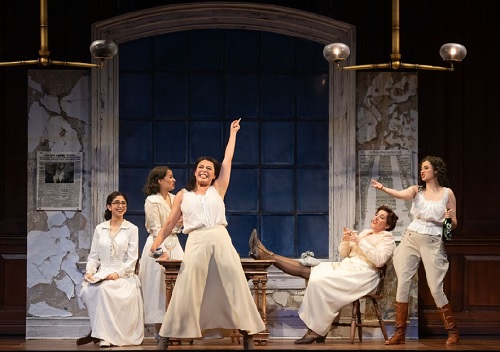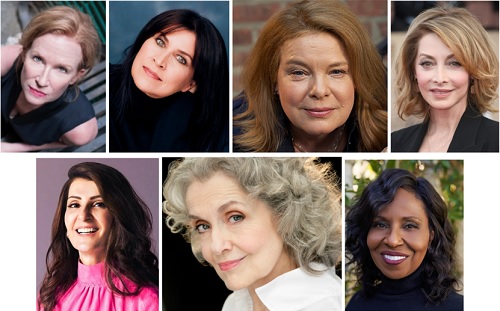NYC News
Review: Suffs Gets My Vote
April 18, 2024, 9:30.39 pm ET

Photo: Joan Marcus
By Brian Scott Lipton
Musical theater has long given short shrift to America’s unsung heroines, which is one reason that Shaina Taub’s bracing musical “Suffs,” now at the Music Box Theatre, feels like both a celebration and a corrective as we hear from more than a dozen such ladies who helped get women the vote in 1920. Now, if only all of America’s women (and men) would use that vote wisely, we’d really have reason to party.
Indeed, if you’ve never known anything about the single-minded suffragist Alice Paul (convincingly played by Taub), her older, more genteel “rival” Carrie Chapman Catt (a sublime Jenn Colella), the outspoken African American journalist Ida B. Wells (the brilliant Nikki M. James), the headstrong Inez Milholland (a glamorous, glorious Hannah Cruz) or determined factory worker and political activist Ruza Wenclawska (a sensational Kim Blanck) – and odds are you have not -- their names and their struggles will now be cemented in your memory.
Further, while the details presented here may be lightly exaggerated, there is no question that Taub has done her homework. For example, Paul’s good friend, the bookish Doris Stevens (Nadia Dandashi) not only changed the mind of attorney Dudley Malone (a winning Tsilala Brock) – who worked directly for then-president Woodrow Wilson (portrayed in a stunning, vaudevillian-like turn by Grace McLean) -– but she also eventually won his heart.
Equally true, Tennessee mom Phoebe Burn (the sublime Emily Skinner) really did send a last-minute missive to her son, Tennessee State Senator Harry Burn (Jenna Bainbridge), causing to him change his mind and vote for the 20th Amendment to finally pass. Once again, truth is stranger than fiction.
By focusing on these lesser-known figures, “Suffs” differs greatly from its otherwise rather obvious predecessor, “Hamilton,” although the two shows share a somewhat similar approach to unveiling the behind-the-scenes moments in history, and there’s more than touch of Lin-Manuel Miranda’s influence in Taub’s score.
Under Leigh Silverman’s simple but elegant direction, the show smartly allows Taub’s wildly varied score to fully shine, from Wells’ piercing rebuke to segregation “Wait My Turn” to the charming comic duet “If We Were Married” to the rousing Act Two opener “The Young Are at the Gates.” Luckily, Taub even allows herself one “big” number, the appropriately titled “Finish the Fight,” which is essentially Alice’s “I Want” song. Indeed, Taub has a unique and accomplished gift for melody and lyrics that makes you want to hear more of her work.
As a book writer, though, Taub can get a little too preachy and sanctimonious (much like Paul). Moreover, since the story is a bit A-to-B – and we already know how it ends – the piece could use some extra drama, especially in letting us know a bit more about the characters’ personal lives. And the piece still could use just a bit of judicious editing.
And while it’s not totally necessary, the show’s epilogue set in 1975, as a young NOW worker visits and elderly Paul who is working on the passage of the Equal Rights Amendment, is an important reminder about the continued need for female equality, and how hard it seems to achieve it in America.
SEE DETAILS/TICKETS
LATEST NYC NEWS

Things to See and Do This Holiday Week in New York City
December 25, 2024, 3:34 pm ET
Residents and tourists alike can enjoy holiday-themed events in New York City between Christmas and New Year! Here are some of them: Elf: The MusicalExperience the magical return of Buddy the Elf i... READ MORE

The Pirates of Penzance Returns for Six Performances
December 24, 2024, 6:25 pm ET
The New York Gilbert & Sullivan Players (NYGASP) will present six performances of “The Pirates of Penzance,” January 4-5 & January 11-12, at John Jay College’s Gerald W. Ly... READ MORE

Sharon Lawrence, Nancy Mckeon, Nia Vardalos Among Stars of Off-Broadway’s Pen Pals
December 24, 2024, 12:49 am ET
Complete casting has been announced for “Pen Pals, a poignant and heartwarming new play by Michael Griffo, which will continue at the Theatre at St. Clements through February 9. The play, whi... READ MORE


 Sign up for our newsletter !
Sign up for our newsletter !